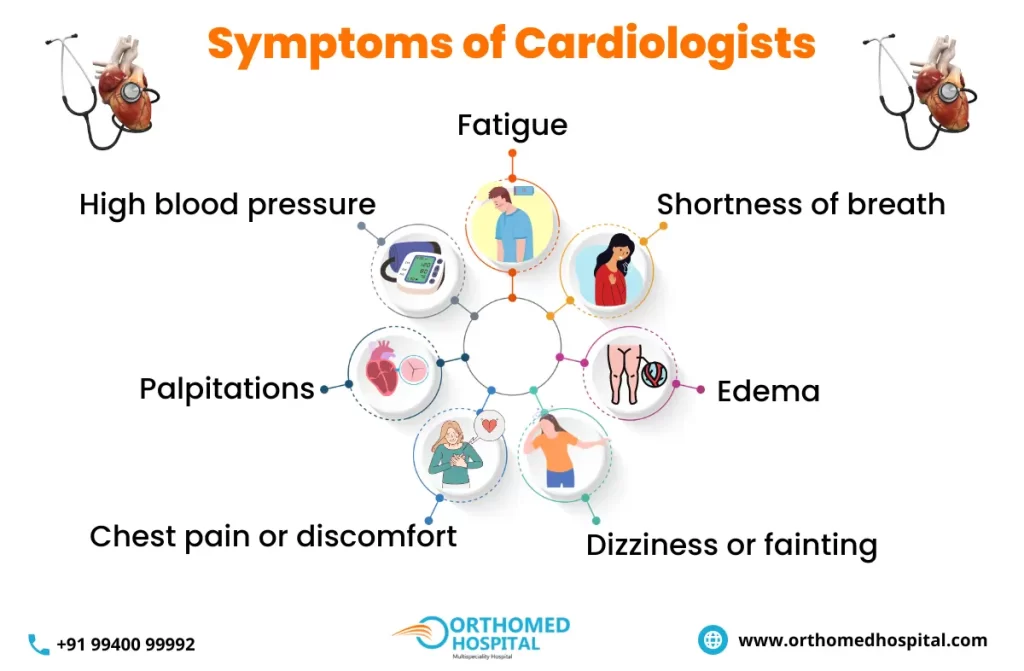A cardiologist is a medical specialist trained in the diagnosis, treatment, and prevention of diseases and conditions related to the cardiovascular system. This vital system includes the heart and blood vessels, playing a crucial role in maintaining overall health. The best cardiologist in Chennai undergoes extensive education and specialized training to become experts in their field, enabling them to provide comprehensive care to patients with various cardiovascular issues.
Who is a Cardiologist?
A cardiologist is a medical doctor who has completed a general medical degree (MD or DO) followed by a residency in internal medicine. Afterward, they undertake additional specialized training in cardiology, typically through a cardiology fellowship that lasts two to three years.
During this fellowship, the best cardiologist in Chennai will gain expertise in diagnosing and managing various cardiovascular diseases and conditions. After completing their training, cardiologists may further specialize in specific areas like interventional cardiology, electrophysiology, or heart failure management.

Conditions Treated by Best Cardiologist in Chennai
The best cardiologist in Chennai diagnoses and treats a wide range of cardiovascular conditions, including:
- Coronary Artery Disease (CAD): Atherosclerosis or plaque buildup in the arteries that supply blood to the heart, leading to chest pain (angina) or heart attacks.
- Heart Failure: The heart’s inability to pump blood efficiently, causes fluid retention, shortness of breath, and fatigue.
- Arrhythmias: Irregular heart rhythms are treated by the best cardiologist doctor in Chennai as they can lead to palpitations, dizziness, and fainting.
- Valvular Heart Diseases: Malfunction or damage to the heart valves, affecting blood flow and causing symptoms like fatigue and edema.
- Hypertension (High Blood Pressure): Persistently elevated blood pressure, a significant risk factor for heart disease and stroke.
- Congenital Heart Defects: Structural heart abnormalities present from birth, which may require surgical correction.
- Pericardial Diseases: Inflammation or fluid buildup in the sac surrounding the heart.
- Peripheral Artery Disease (PAD): Narrowing or blockage of blood vessels outside the heart will have to be addressed by the cardiologist specialist in Chennai because it commonly affects the legs.
Why should you consult a Cardiologist?
Consulting a cardiologist is crucial for various cardiovascular concerns and overall heart health. A cardiologist specializes in diagnosing and treating heart conditions. Common reasons to consult a cardiologist include:
1. Chest Pain: Persistent or severe chest pain may indicate heart issues.
2. Heart Palpitations: Irregular heartbeats or palpitations should be evaluated.
3. High Blood Pressure: Monitoring and managing hypertension is vital.
4. Shortness of Breath: Difficulty breathing may be related to heart or lung conditions.
5. Family History: If there’s a family history of heart disease, regular check-ups are advisable.
6. Diabetes: People with diabetes have an increased risk of heart disease.
7. Cholesterol Issues: Abnormal cholesterol levels may require cardiovascular assessment.
8. Preventive Check-ups: Routine check-ups can help detect and manage risk factors before they become serious.
Always consult a healthcare professional for personalized advice based on your specific health situation.
Check out Diabetology in Chennai.
Tests and Procedures
Cardiologists employ various diagnostic tests and procedures to assess cardiovascular health and determine appropriate treatments. Some common tests provided by the best cardiologist in Chennai include:
- Electrocardiogram (ECG/EKG): Records the heart’s electrical activity to detect irregularities and diagnose arrhythmias.
- Echocardiography: Uses sound waves to create images of the heart’s structure and function, aiding in the diagnosis of valve problems and heart failure.
- Stress Tests: The cardiologist specialist in Chennai evaluates the heart’s response to physical stress, helping diagnose CAD and assessing exercise tolerance.
- Cardiac Catheterization: The best cardiologist doctor in Chennai will insert a catheter into the heart to diagnose and treat certain heart conditions, such as blocked arteries.
- Holter Monitor: A portable device that records the heart’s electrical activity over 24 to 48 hours, providing continuous ECG monitoring.
- Cardiac MRI and CT Scan: Advanced imaging techniques used to assess heart structure and function in detail.
- Angioplasty and Stent Placement: Minimally invasive procedures to open blocked coronary arteries and improve blood flow.
- Pacemaker and Implantable Cardioverter-Defibrillator (ICD) Placement: Devices that help regulate heart rhythm and prevent sudden cardiac arrest.
- Ablation: A procedure to treat certain arrhythmias by using energy to destroy abnormal heart tissue.
- Heart Surgery: The cardiologist specialist in Chennai will collaborate with cardiovascular surgeons to perform open-heart surgeries for complex conditions.
How to Choose the Best Cardiologist?
Selecting the best cardiologist in Chennai is crucial for receiving high-quality care and achieving the best possible outcomes.
1. Credentials: Look for a cardiology specialist who is board-certified in cardiology and has extensive experience treating your specific condition.
2. Referrals and Recommendations: Seek recommendations from your primary care physician, friends, or family members who have had positive experiences with cardiologists.
3. Hospital Affiliations: Ensure that the best cardiologist doctor in Chennai is affiliated with reputable hospitals known for their cardiovascular care.
4. Communication and Bedside Manner: A good cardiologist should listen to your concerns, explain complex medical terms in a clear manner, and make you feel comfortable during appointments.
5. Specialization: If you have a specific cardiovascular issue, consider seeking a cardiologist with expertise in that particular area.
6. Reviews and Testimonials: Check online reviews and patient testimonials to gauge the cardiologist’s reputation and patient satisfaction.
7. Insurance Coverage: Confirm the best cardiologist in Chennai is part of your insurance network to minimize out-of-pocket expenses.
8. Location and Availability: Choose a cardiologist with a convenient location and office hours that suit your schedule.
What are the types of specializations?
Cardiology offers various specializations:
1. Interventional Cardiology: Focuses on catheter-based treatments for heart conditions.
2. Electrophysiology: Specializes in heart rhythm disorders and pacemaker/defibrillator implantation.
3. Heart Failure/Cardiac Transplantation: Addresses advanced heart failure and transplantation.
4. Non-Invasive Cardiology: Emphasizes diagnostic techniques without invasive procedures.
5. Pediatric Cardiology: Deals with heart conditions in children.
6. Cardiac Imaging: Specializes in advanced cardiac imaging technologies.
These specialties ensure comprehensive care across diverse cardiovascular issues.
Conclusion
To conclude, the best cardiologist in Chennai at Orthomed Hospital plays a vital role in diagnosing, treating, and preventing cardiovascular diseases, ensuring the well-being of patients’ hearts and overall health. Always remember to prioritize regular check-ups and adopt a heart-healthy lifestyle to prevent cardiovascular issues in the first place.
Read also Best Dermatologist in Chennai.


